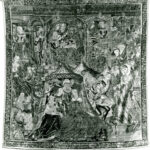Biography of Gertrude de Dabo
Gertrude de Dabo, also known as Gertrude von Dabo-Dagsburg, was a remarkable noblewoman who lived during the 12th and 13th centuries. She was born around 1190 or 1200 and passed away before March 19, 1225. Gertrude held the esteemed title of Countess of Metz, Dabo (Dagsburg), and Eguisheim, inheriting these territories from her influential family, the Dabo-Moha lineage. Her life and actions played a significant role in the political and social landscape of the region during her time[1][2].
Early Life and Inheritance
Gertrude was the cherished daughter of Albert II of Dabo-Moha, a distinguished nobleman, and a daughter of Margrave Hermann IV of Baden. She grew up in a privileged environment, surrounded by the trappings of aristocratic life. Tragically, Gertrude lost her two brothers, who were expected to succeed their father, making her the sole heiress of the family’s vast estates. As a result, she inherited the counties of Metz, Dabo, and Eguisheim[1].
Reign and Marriage
Following the death of her father in 1212, Gertrude assumed the title of Countess and began her independent rule. It was during this time that she married Thiebaud I, a prominent figure who would later become the Duke of Lorraine. The union between Gertrude and Thiebaud I solidified political alliances and strengthened the influence of both families. Together, they faced numerous challenges, including maintaining stability in their territories and dealing with external threats to their power[2].
Gertrude’s position as Countess and her marriage to Thiebaud I placed her in a position of great responsibility and authority. She actively participated in the governance of her domains, making important decisions regarding administration, justice, and the welfare of her subjects. Her rule was characterized by a keen understanding of politics and diplomacy, enabling her to navigate the complex dynamics of the feudal society of the time.
Later Life and Legacy
Sadly, Gertrude’s first husband, Thiebaud I, passed away in 1220. A short time after his death, Gertrude remarried to Thiebaud IV, Count of Champagne, further cementing her connections to other influential families of the era. However, despite her marriages, Gertrude did not have any children. Her lack of direct heirs raised concerns about the succession of her titles and lands.
Gertrude de Dabo’s reign came to an end before March 19, 1225, as she passed away at a relatively young age of approximately 35. Her death marked the conclusion of an era for the Dabo-Moha lineage, as the direct line of succession ceased with her. However, her legacy and the lands she once ruled remained significant, and her territories would pass on to other noble families through inheritance and alliances.
Gertrude de Dabo’s influence extended beyond her lifetime. Through her marriages and her strategic choices, she played a pivotal role in shaping the political landscape of the region. Her descendants would go on to leave their mark on the annals of history, perpetuating the heritage of the Dabo-Moha family for generations to come.
Sources
- Cawley, Charles. Medieval Lands: A Prosopography of Medieval European Noble and Royal Families, Online at Foundation for Medieval Genealogy Website (accessed 23 Jan 2022). Alsace Chapter 5 B Grafen von Egisheim und Dagsburg (Moha)
- Anstett, Jérôme. Le Navire de Pierre, Histoire du Rocher de Dabo. p58-62. Sarrebourg, France: Reproservice, 2021.







